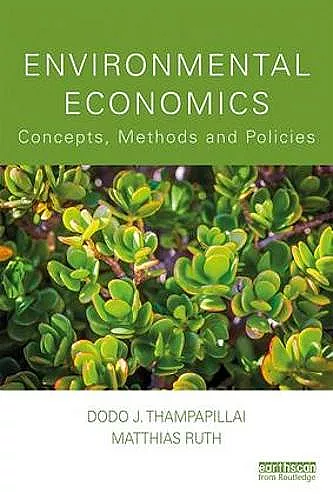Environmental Economics
Concepts, Methods and Policies
Matthias Ruth author Dodo J Thampapillai author
Format:Paperback
Publisher:Taylor & Francis Ltd
Published:28th May '19
Should be back in stock very soon
This paperback is available in another edition too:
- Hardback£145.00(9781138060036)

Environmental Economics explores the ways in which economic theory and its applications, as practised and taught today, must be modified to explicitly accommodate the goal of sustainability and the vital role played by environmental capital.
Pivoting around the first and second laws of thermodynamics, as well as the principles of ecological resilience, this book is divided into five key parts, which includes extensive coverage of environmental microeconomics and macroeconomics. It drills down into issues and challenges including consumer demand; production and supply; market organisation; renewable and non-renewable resources; environmental valuation; macroeconomic stabilisation, and international trade and globalisation. Drawing on case studies from forestry, water, soil, air quality, and mining, this book will equip readers with skills that enable the analyses of environmental and economic policy issues with a specific focus on the sustainability of the economy.
Rich in pedagogical features, including key concepts boxes and review questions at the end of each chapter, this book will be a vital resource for upperlevel undergraduate and postgraduate students studying not only environmental economics/ecological economics but also economics in general.
"An economics textbook that puts environmental capital in first place, and then uses good economic theory to arrive at truthful conclusions and relevant policies. A big step forward in teaching economics!" -- Herman Daly, Emeritus Professor, University of Maryland, School of Public Policy, USA
"At last an economics textbook that acknowledges that the basis of an economy is the environment. The potential role of economics in addressing many of the environmental issues facing our planet, especially climate change, has been hampered by the incomplete nature of the basic tenets of neo-classical economics. This book corrects that problem and will provide students with the tools to make much sharper contributions to current policy debates. It is an ideal textbook for any serious environmental economics course." -- Peter Phibbs, Department of Urban and Regional Planning Director, Henry Halloran Trust, University of Sydney, Australia
ISBN: 9781138060050
Dimensions: unknown
Weight: 520g
324 pages